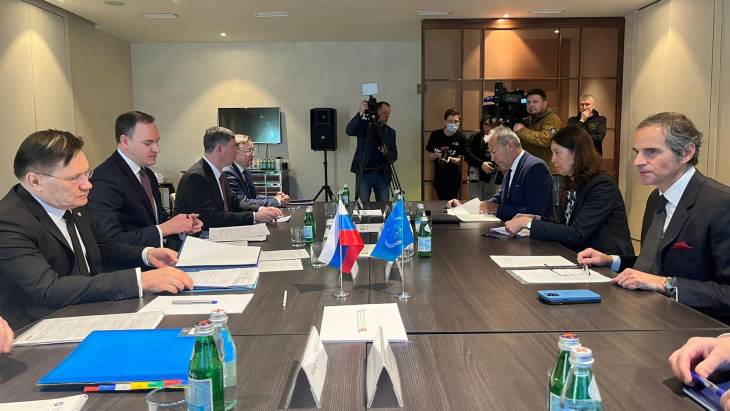Ukraine says Russian forces have left Chernobyl
Ukraine says Russian forces have left Chernobyl
01 April 2022
Latest updates, 1 April:
• Ukraine says Russian forces, who took control of Chernobyl on 24 February, have left and handed it back to Ukraine
• IAEA Director General Rafael Mariano Grossi holds talks in Kaliningrad with Russian officials about nuclear safety in Ukraine
• He says he will head an IAEA "assistance and support mission" mission to Chernobyl "as soon as possible"
• He said that the IAEA had agreed a safety framework, agreed separately with Ukraine and with Russia • The World Association of Nuclear Operators has transferred Ukraine's nuclear operator Energoatom from its Moscow to its Paris centre
 The IAEA's Grossi held talks with Rosatom Director general Alexey Likhachev (Image: @rafaelmgrossi/Twitter)
The IAEA's Grossi held talks with Rosatom Director general Alexey Likhachev (Image: @rafaelmgrossi/Twitter)
Ukraine informed the International Atomic Energy Agency (IAEA) on 31 March that the Russian forces had, in writing, transferred control of Chernobyl nuclear power plant to Ukrainian personnel and moved its troops towards Belarus. A convoy of Russian troops had also left the city of Slavutych, where most of the Chernobyl staff live.
Energoatom reported on 1 April that all Russian troops had left Chernobyl and Slavutych. Since 24 February, Russian forces had been in control of the site. The Ukrainian staff had continued to operate it, but the shift that was on duty on 24 February was unable to leave the site and be replaced until 20 March, since when there has been no further rotation of workers.
In its 31 March update, the IAEA said it had "not been able to confirm reports of Russian forces receiving high doses of radiation while being in the Chernobyl Exclusion Zone. The IAEA is seeking further information in order to provide an independent assessment of the situation".
The Ukrainian side had warned that Russian forces had not been following the correct protective measures in the area, including by disturbing surfaces when moving vehicles and military personnel and equipment across the exclusion zone, around the site of the 1986 accident.
Meanwhile, the IAEA's Grossi is continuing his efforts to bring in measures to assist in the safety and security of nuclear facilities in Ukraine.
After visiting the South Ukraine nuclear power plant on 30 March for talks with senior Ukrainian officials, he was in Kaliningrad in western Russia on 1 April for talks with Russian officials.
The IAEA said his discussions in Ukraine were to "review the concrete steps that need to be taken to immediately deliver urgent technical assistance for nuclear safety and security to Ukraine".
On 1 April, he posted a photo of the meeting in Russia and wrote on Twitter: "Held very important meeting today with Rosatom Director General Alexey Likhachev and other senior Russian officials in Kaliningrad, Russia. We discussed the latest developments at Ukraine's Chernobyl nuclear power plant and other matters."
He added: "I will head an IAEA assistance and support mission to the Chernobyl nuclear power plant as soon as possible. It will be the first in a series of such nuclear safety and security missions to Ukraine."
At a media briefing on his return to Vienna, Grossi gave more details, saying that after previously trying to secure a tripartite agreement on measures to ensure safety and security of nuclear facilities, he had agreed measures separately with Russia and with Ukraine, which avoided the prospects of delays by having to produce "draft after draft" of a paper.
He said that the agreements meant the IAEA would be able to provide remote advice and support, send relevant experts to the nuclear facilities in Ukraine to assess and assist staff there, deliver much needed equipment and also establish a rapid assistance mechanism which meant that in case of any emergency "we could be sending a team to assess and assist almost immediately".
He said there was "a lot of work to be done at Chernobyl" and said that the IAEA would be seeking to get "as good an assurance as we can" on safety to avoid putting its staff "in harm's way" although they had to recognise that there was an armed conflict with shelling, so some sort of safe zones were needed to move staff and equipment through.
The IAEA hoped to send experts to the Zaporozhe nuclear power plant, he said, which continues to be under the control of Russian forces, but he said "different circumstances" may require a "different approach" but he did not think it was an impossibility.
Energoatom reported on 1 April that its four nuclear power plants were operating and providing the necessary amounts of electricity for the country’s needs. It said "radiation, fire and environmental conditions at the industrial sites of nuclear power plants and adjacent territories have not changed and are within current standards".